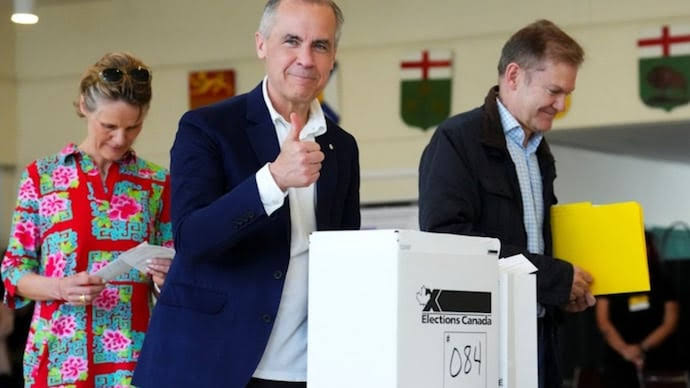Ottawa (Rajeev Sharma): Canadians cast their votes on Monday to choose their next Prime Minister in a highly charged election overshadowed by US President Donald Trump’s renewed trade war rhetoric and annexation threats. As polls closed nationwide, early projections indicated the Liberal Party, led by Prime Minister Mark Carney, gaining a slight edge over Pierre Poilievre’s Conservatives.
According to the CBC’s latest projections, the Liberals have secured 23 seats and are leading in 85 others. In comparison, the Conservatives have won 11 seats and are ahead in 81 others. Meanwhile, the Bloc Québécois is leading on 16 seats and the New Democratic Party (NDP) on three.
The election marks a potential dramatic turnaround for the Liberals. Back in January, when former Prime Minister Justin Trudeau announced his resignation, the Conservatives held a commanding 20-point lead over the Liberals. However, Carney’s leadership, coupled with rising national unease over Trump’s aggressive posturing toward Canada, revitalized Liberal fortunes. CBC’s final poll aggregator showed the Liberals with 42.8% national support against the Conservatives’ 39.2%.
Voter engagement has been unprecedented, with nearly 29 million Canadians eligible to vote and a record 7.3 million casting early ballots. Canadians are electing 343 Members of Parliament, requiring at least 172 seats for a majority. The Liberals previously governed with a minority since 2019, having won a majority in 2015.
The election campaign was briefly suspended after a deadly car attack at a Vancouver street fair over the weekend, further heightening emotions. As voting progressed, Trump’s social media taunts reignited tensions. He provocatively claimed the US should annex Canada, saying it “subsidizes” its northern neighbor. The comments were swiftly condemned across Canada’s political spectrum.
Conservative leader Pierre Poilievre, often accused of being too soft on Trump during the campaign, issued a firm rebuttal: “President Trump, stay out of our election. Canada will always be proud, sovereign and independent and we will NEVER be the 51st state,” he posted on X.
Prime Minister Carney responded equally strongly, stating, “This is Canada and we decide what happens here.”
For Carney, a 60-year-old former Bank of Canada and Bank of England governor who took over leadership from Trudeau just last month, the election is a pivotal test. Both Carney and Poilievre have promised to accelerate talks to renegotiate the US-Canada free trade agreement to address mounting economic uncertainties.
With final results expected soon, the performances of smaller parties like the NDP and Bloc Québécois could still be decisive in determining whether the Liberals can clinch a majority or will need to form another minority government.
Mark Carney’s Liberals Edge Ahead as Canadians Vote Amid Trump’s Provocations

